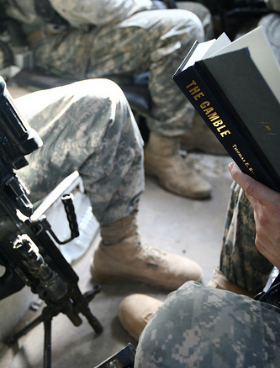Some new military reading lists make me wonder: Can today's top generals keep up with today's corporals?

As longtime little grasshoppers
know, I'm
a fan
of reading
lists. Here is one
from former Army chief of staff Gen. Martin Dempsey -- where is he now? Here is
another
from a Marine sergeant major. I actually prefer the Marine's, which has
less pop journalism and more history.
And here is Exum's
response to Dempsey's. It also is a much better list than the official one.
(And here is Exum's short list of essential
reading to help one understand the war in Afghanistan. While I'm at it,
here is a roundup from The Economist of new books on the war on terror.)
Here
Greg Jaffe reviews the bidding, noting that, "The problem, it seems, is
that Dempsey's tastes run toward the middle brow."
There is an interesting pattern
here: The less rank one has, the more intellectually rigorous the list? Put
another way: Are our generals keeping up with our corporals?
My friend Frank Hoffman comments
on the Army list:
One might not want to look too deep into this list, as they
are usually the product of a committee, but I am sure that General Dempsey
personally edited the list a bit. Was good to see that he included one book on
Civil-mil relations, although I've not read the Schofield text. The Army has
several good books by Nielson and Snider to use but they might be not
considered as classics. Notably, HR McMaster's book is NOT listed, nor Eliot
Cohen or Bacevich.
Was surprised at the two Friedman books, a bit optimistic
about collaboration for an institutional worldview of Persistent Conflict, and
I think that Lawrence Freedman and Aaron Friedberg and Fareed Zakaria's Post-American World are a
bit more up to date. For senior officers, Colin Gray's Another Bloody Century might
be useful. But the list is well balanced off with the Ramos book and Bob Kaplan's
look at Asia. Kaplan's Imperial
Grunts would have been far more relevant to the Army. The Seb
Junger book on Afghanistan helps the loss there.
Military
strategy items are a bit thin (yes, I do see the required nods to Karl von C
and his Chinese alter ego), this is longer on business books than traditional
lists. I can live without Gladwell, as Outliers is his worst book but
the underlying message of hard work is not without merit. The Moten book
is very useful at least for war termination but actually more on
policy-strategy interface. Colin Gray's pithy Fighting Talk on strategic maxims could have be
leveraged better to fill the strategy hole.
Thomas E. Ricks's Blog
- Thomas E. Ricks's profile
- 436 followers



